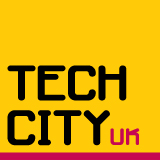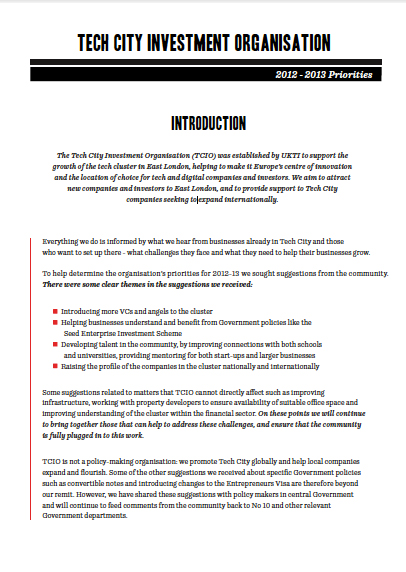The second of the Guardian Tech Weekly Podcast talks on Tech City took place on Monday evening, this time focusing on the issue of innovation and entrepreneurship and looking at ‘what government, investors and the people at the coalface believe is necessary to inspire innovation and to generate globally competitive enterprise’.
As with the recent debate on skills, the panel and the audience (and Twitter) engaged in a lively debate which covered off a variety of topics around the issue of how best to encourage and foster an environment in which innovation and entrepreneurship are second nature. The podcast is now live and available to listen to or download here, but in the meantime we’ve summarised some of the key points raised below. Please note that it is intended to be an indication of the lines of argument rather than a verbatim transcript – those seeking quotes should refer to the podcast itself.
This week’s panel consisted of:
- Eric Pickles MP – Secretary of State for Communities and Local Government
- Alexandra Deschamps-Sonsino (founder and CEO of Designswarm and co-founder of Tinker London)
- Tara Solesbury (Digital Media & Creative Industries Consultant)
- Additional input came from Eric Van Der Kleij, CEO of the Tech City Investment Organisation, and Elizabeth Varley of TechHub
Main points raised included:
- The inherent individuality of businesses, particularly in the creative industries, and as such the difficulties involved in finding a strategy which can assist all of them within an area / cluster, regardless of size. Key to doing this is to establish a rapport / dialogue with local community businesses to establish their goals and needs. This has worked well in Brighton over the past decade, especially in terms of the gaming industry, which drove the development of the South Coast’s technology cluster by choosing the city as its home (Tara Solesbury)
- The three elements vital to the success of an Enterprise Zone: tax discounts, superfast broadband and local development orders to simplify and streamline the planning process (Eric Pickles MP, Secretary of State for Communities and Local Government)
- One of the interesting challenges facing Tech City is to attempt to bridge the policy gap between initiatives catering for SMEs (as traditionally defined as having up to 49 employees) and those designed to help fledgling startups who will often have a staff base of less than 5. It is important to note the very real differences in priorities facing these different sorts of businesses, and to cater for both sets (Alexandra Deschamps-Sonsino)
- Tech City is more about an ethos than it is London per se – it’s an attempt to foster the creation of centres of innovation where people with ideas can collaborate and feed off each other, and is part of a desire to create a ‘dare to share’ mentality – one in which Government doesn’t mess with things (Eric Pickles, Secretary of State for Communities and Local Government)
- Tech City is now the fastest-growing tech/digital cluster in Europe. The Tech City Investment Organisation was established to accelerate the development that was already happening organically in and around Shoreditch and the surrounding areas – the objective is to turn the success of the Tech City cluster into a national model for growth (Eric Van Der Kleij)
- The current attention being focused on East London needn’t be to the detriment of existing, or emergent, tech clusters elsewhere (eg Brighton, Cambridge, etc) – there is the potential for parallel successes, as each are offers a unique mix of attractors to potential businesses (Tara Solesbury)
- It is vital that there is a recognition of the importance and needs of local businesses in these clusters, regardless of their sector, so as to best preserve the character and ethos of an area. Similarly, the diversity of an area is crucial to its development; it is important to be able to draw on a wide base of differing talents, and it is this which is a great strength of London (Tara Solesbur / Alexandra Deschamps-Sonsino)
- Power to make decisions as to the best way in which to develop clusters should eventually be devolved to local communities to facilitate agile implementation of good, locally viable ideas on planning, taxation, etc (Eric Pickles MP, Secretary of State for Communities and Local Government)
- Transport infrastructure is vital to the success of any cluster – one of the biggest reasons behind the recent explosion in interest in, and investment into, Tech City has been the opening of the East London line which provides vastly improved transport to the area (Alexandra Deschamps-Sonsino)
- This shouldn’t be looked at as another tech ‘bubble’ – businesses with revenue generation at the core of their business model will be the real winners. The austere economic conditions are also helping to drive the recent resurgence in the tech sector in East London – there’s a feeling that if you don’t have a job, you can now make one (Elizabeth Varley)
- One of the measures of success for Tech City can be defined, in the short-term, as the creation of jobs in the area – and, longer term, in developing an environment where there is a skilled workforce ready to fill those jobs, which initiatives like Silicon Milk Roundabout are on track to assist with (Eric Van Der Kleij)





